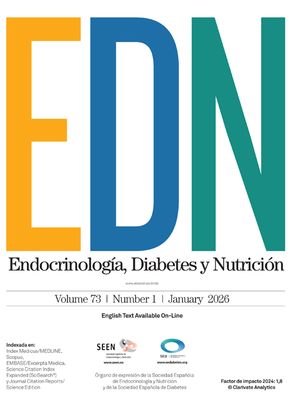Obesity is a highly prevalent chronic condition which has been considered in recent decades as a true epidemic in both developed and developing countries.1 Prevalence of obesity (BMI≥30kg/m2) in Spain is greater than 23% according to the ENRICA study, and has increased more than 200% from 1993 to 2006.2,3 The high early mortality rates of obesity and, what is more important, its significant comorbidity impair the quality of life of obese people and lead to a high healthcare resource utilization. Thus, multiple studies have shown a positive relationship between obesity and impaired quality of life,4–8 but perception of this impairment may vary depending on the evaluated population and/or country.
A recent study conducted by the Obesity Group of SEEN (GOSEEN) in collaboration with the Duke University (Durham, NC, USA) demonstrated that obese Spanish patients had a poorer perception of their quality of life than their US counterparts with similar BMI values.9 For this study, data were collected from 400 Spanish patients with morbid obesity from different regions (Andalusia, Asturias, Catalonia, Galicia, Balearic Islands, Madrid, and Basque Country) and from 400 obese subjects from the Duke University database matched by BMI, age, and sex. Patients in both groups were Caucasian and had sought the help of healthcare professionals to treat their obesity. The tool used to assess quality of life was the short form of the Impact of Weight in Quality of Life (IWQOL-Lite).10 This test consists of 31 self-administered items providing scores in five different domains (physical function, self-esteem, sexual life, public distress, and work) and is validated in different languages, including Spanish.11 Four hundred nonobese subjects from each of the two countries were also assessed.
Results showed that obesity caused quality of life impairment in all items as compared to nonobese subjects. However, when results were compared based on the origin of obese individuals, total score was worse in Spanish as compared to US subjects, more specifically in the physical function, sexual life, and work domains. By contrast, no differences were seen in self-esteem or public distress. The fact that Spanish obese patients perceive a poorer quality of life than their US counterparts with the same BMI may be related to the shorter duration of the obesity epidemic in Spain as compared to the US. In Spain, obese people have had less time to become accustomed to living with their excess weight, or adequate adaptations to make this condition more bearable, such as wider chairs in waiting rooms, public transport or at movie theaters, theaters, and stadiums have not been implemented yet.
An additional significant finding in this study was the different perception of quality of life by obese patients depending on sex. Thus, women have a poorer quality of life than men in terms of self-esteem in both the Spanish and US cohorts, and US women also in terms of sexual life. These data are not surprising considering the great pressure as regards physical appearance–from the media, social pressure to search for a relation, or pressure when searching a job, particularly a customer-facing job–to which women of any country are subjects. Similar to the findings in Spain, a study comparing the quality of life of Portuguese and US women with overweight also reported a poorer quality of life in those living in the Iberian Peninsula.12
Therefore, our modest conclusion after reading the few available studies comparing obese patients from different countries less accustomed to live with obesity is that these countries are less prepared to facilitate the daily life of these people, which has a negative impact on their quality of life. We cannot thus sit and wait for a spontaneous improvement in the quality of life of Spanish obese people over the years. We must instead take actions aimed not only at decreasing incidence of obesity, but also at facilitating life with obesity to people stigmatized by it. The “Alliance of cities against obesity” started this same year by our group during the recent SEEN meeting in Granada seeks implication of local authorities in achievement of these objectives and, in our view, may serve as an example to others.
Current members of the Obesity Working Group of the Spanish Society of Endocrinology and Nutrition (GOSEEN): José Arrizabalaga, Irene Bretón, Marta Bueno, Alfonso Calañas, Assumpta Caixàs, Soralla Civantos, Fernando Cordido, María Jesús Díaz, Lilian Flores, Pedro Pablo García-Luna, Albert Goday, Albert Lecube, Susana Monereo, María José Morales, Basilio Moreno, Silvia Pellitero, Miguel Ángel Rubio, Francisco Tinahones, Núria Vilarrasa. Bartolomé Burguera, Paloma Iglesias, Basilio Moreno, Lluís Masmiquel, José Moreiro, and Josep Vidal were members of the group when the study was conducted and participated in the study.
The names of the current GOSEEN components are listed in Appendix 1.
Please cite this article as: Caixàs A, Lecube A, en nombre del Grupo de Trabajo de Obesidad de la Sociedad Española de Endocrinología y Nutrición (GOSEEN). ¿Dónde son más felices las personas obesas? Endocrinol Nutr. 2014;61:1–2.




